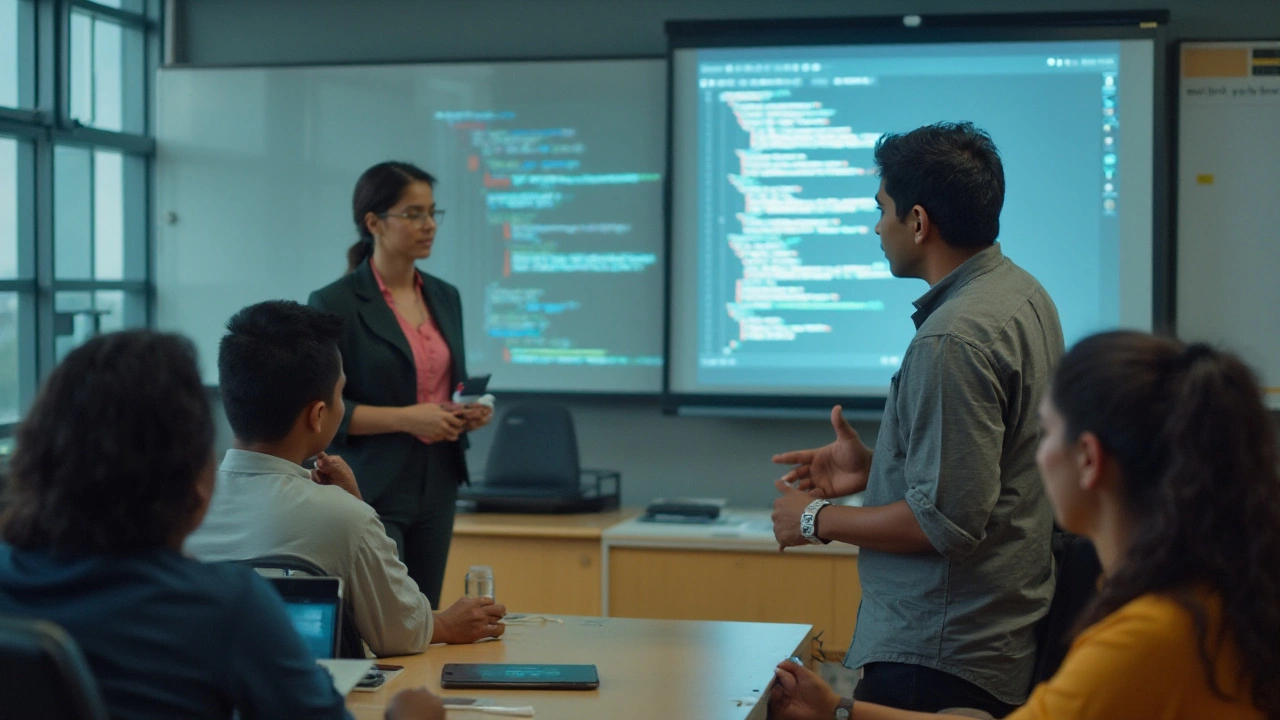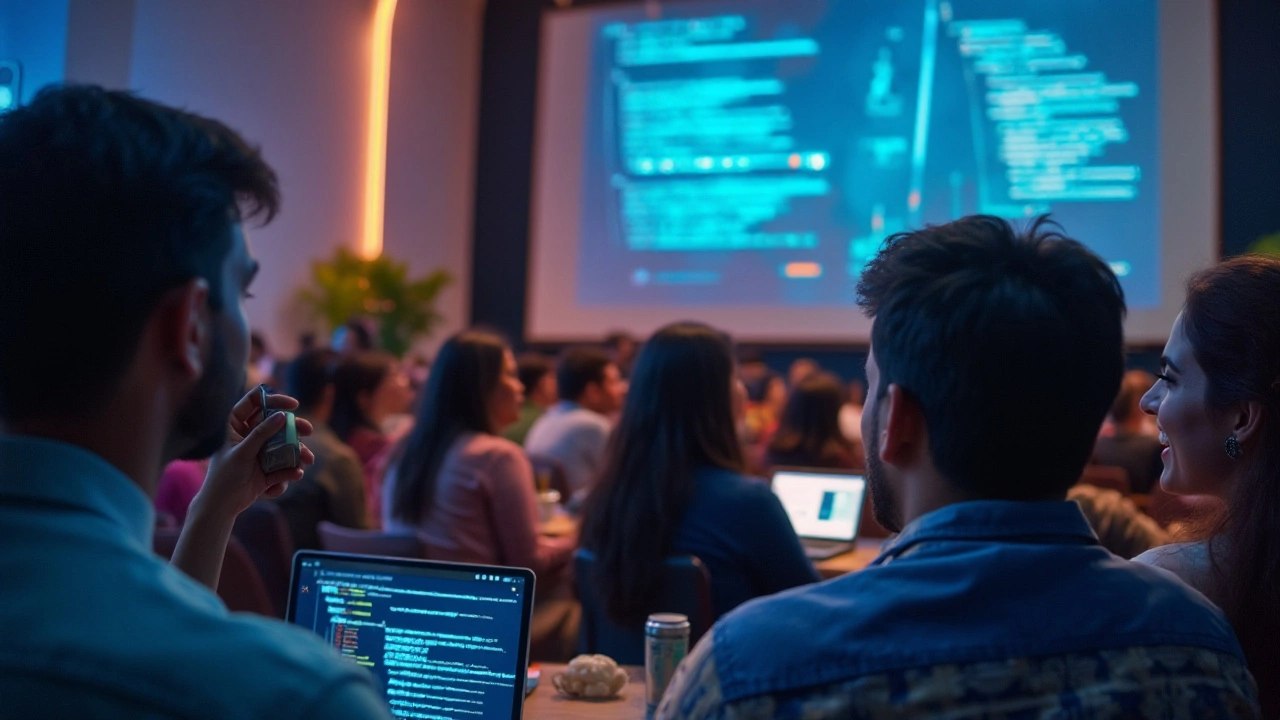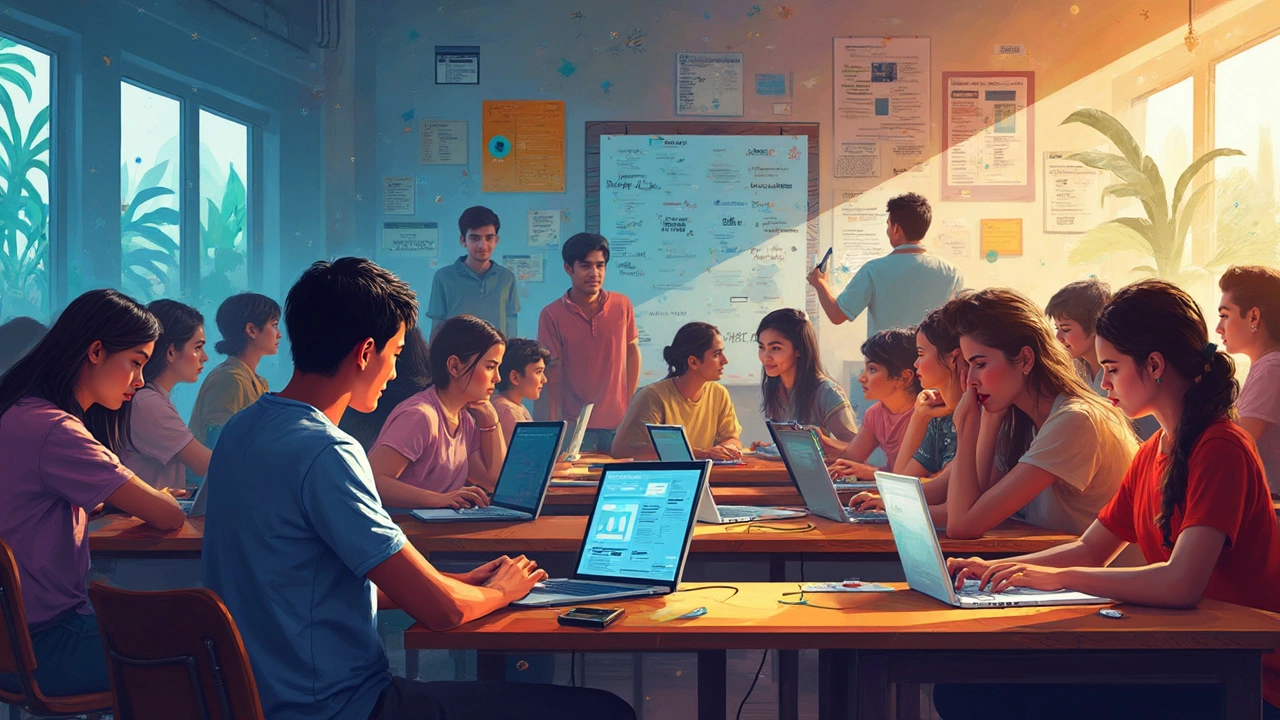Is there a gulf between programming and coding? Many people use these words interchangeably but they actually point to distinct concepts. Understanding what sets them apart is crucial for anyone looking to jump into the world of technology.
Coding can be seen as the building blocks—the hands-on task of writing the code that machines will use to perform instructions. On the other hand, programming is about more than writing code; it is strategizing, planning, and executing a solution to a problem.
It's not surprising that people are often torn between choosing to hone their skills in coding or in programming. Each offers different benefits and opportunities, depending on what interests or career goals you have in mind. Dive into this realm to discover where your passion might find its perfect fit.
- Understanding Programming and Coding
- Key Differences Between Coding and Programming
- Benefits of Learning Coding
- Benefits of Learning Programming
Understanding Programming and Coding
Diving into the world of coding and programming can be compared to learning a new language. Just as you would study grammar and vocabulary in French or Spanish, understanding the syntax and semantics of programming languages is essential for translating human ideas into a form that computers can comprehend. At the heart of this lies coding, which is the process of assigning a code to something for classification or identification. It involves writing lines of code in a language understood by computers, such as Python, Java, or C++. Programming, however, is a broader discipline that encompasses the entire process of designing and building an executable computer software application to accomplish a specific computing result.
The confusion between coding and programming isn't just terminology; it's a reflection of how these two disciplines interact. Coding is a subset of programming. It is like the laborer laying each brick of a grand building, while programming is akin to the architect drawing the plans. Good code architects not just programs to solve a task but also understand algorithms and data structures to build efficient, effective solutions. They work systematically to resolve complex problems by dissecting them into smaller, manageable pieces. Coders, on their part, focus on the specific task of creating a functional output from a given instruction.
"Programming is how you get computers to solve problems. Coding is just a part of that," says Charles Wetherall, a veteran software developer.
A practical example to illustrate this difference could be developing a video application. The programmer will outline the logic of how the application will process user inputs, fetch video content, buffer it efficiently, and play it back. This requires an understanding of algorithms, network management, and possibly even user interface design. The coder, on the other hand, might be tasked with writing a specific module, such as the part of the code that retrieves data from a server, ensuring it all adheres to the industry standards and protocols.
In industry terms, the distinction also relates to job roles. Many tech companies search for 'developers' or 'software engineers,' terms that lean more towards programming than coding. However, coding is indispensable. Without good coding foundations, programmers cannot implement their grand designs. It makes the coder akin to an artisan who masters the craftsmanship of their trade. To sum it up, while all programming involves coding, not all coding qualifies as programming. That's something crucial for aspiring tech enthusiasts to understand as they embark on their journey.

Key Differences Between Coding and Programming
When you dive into the tech arena, you'll quickly encounter both coding and programming. On the surface, these terms might seem like synonyms, but they cater to distinctly different stages in software development. Let's unveil the layers behind these activities. At its core, coding is the act of translating human thoughts into a language that machines can understand. It's about writing the instructions for a computer using a specific coding language, like Python or Java. Think of it as the written script of a play. Without this script, actors—in our case, computers—have nothing to perform. Meanwhile, programming forms the larger creative and strategic umbrella. It involves not only coding but also planning, design, testing, and debugging of entire programs or systems. It's akin to a director's role, encompassing the conception, management, and bringing to life of a play, from plot to stage management.
Breaking Down the Roles
Let's unravel what sets these roles even further apart. In coding, the primary task is about writing lines of code that translate a plan or idea into a machine-readable format. Coders often focus on specific segments of a larger program, dealing heavily with syntax, or how the code must be structured to be properly understood by a computer. Common tasks include error-checking, interpreting designs to code, and maintaining streamlined yet functional lines of code. In contrast, a programmer operates on a broader level. They take abstract ideas and build a framework—a comprehensive vision of the software solution. This includes designing algorithms, managing resources, determining the feasibility of the project, and ensuring that different sections of code interact cohesively within the system.
“The difference between a coder and a programmer is akin to a musician playing sheet music versus a composer creating a symphony,” says tech author and instructor Brett Victor.
The tools of the trade also highlight their differences. Coders might focus on integrated development environments (IDEs) like Visual Studio Code or Sublime Text, which streamline the coding process with syntax highlighting and error detection features. Meanwhile, programmers engage in using version control systems such as Git, more robust task management software, and possibly even hardware specifications, to ensure that all pieces come together smoothly.
| Aspect | Coding | Programming |
|---|---|---|
| Scope | Writing code in a specific language | Overall software design and development |
| Focus | Syntax and error-checking | Feasibility, project management, and solution design |
| Tools | IDEs, Code Editors | Version Control, Project Management Software |
Understanding these distinctions helps aspiring tech enthusiasts or even seasoned developers align their roles with their interests and aptitudes. Whether you're captivated by the artistry of writing lines of coding or drawn to the grand orchestration of programming, each path contributes uniquely to the digital landscape. With technology continually evolving, both skills offer abundant pathways to innovation and problem-solving in an ever-expanding digital world. Exploring and mastering them can be a rewarding journey whether you're at the start or mid-way on this tech-driven adventure.

Benefits of Learning Coding
Diving into the world of coding is akin to learning a new language—one that is spoken by computers who keep our modern world ticking. For starters, coding opens up a plethora of job opportunities. With technology infiltrating almost every sector, from healthcare to education, the need for adept coders continues to skyrocket. As you master coding, you position yourself at the helm of innovation, with the unique ability to bring ideas to life through lines of code.
Coding is not just about finding a lucrative career though; it's about developing a new way of thinking. Coding fosters logical and analytical skills that enhance problem-solving capabilities. For instance, when you write a program to perform a specific task, you need to carefully analyze the problem, break it down into smaller parts, and then create a solution that a computer can understand. This approach cultivates critical thinking that is applicable to everyday life's challenges, thus making you more adept at conquering hindrances effectively.
Furthermore, learning to code encourages creativity and precision. Imagine designing a beautiful website or creating captivating animations from scratch—all accomplished through the power of code. This creative process, founded on clear rules and structure, is what attracts numerous people to coding. The satisfaction of seeing your code transform into something tangible is exhilarating and deeply rewarding.
"Coding is about empowerment," says tech educator Reshma Saujani, "It gives everyone a seat at the table to innovate their future."
Flexibility and Remote Work Opportunities
In today’s fast-paced world, programming and coding skills offer the flexibility to work across the globe. As remote work becomes more prevalent, coding careers provide unmatched freedom to work from virtually anywhere. This means you can structure your work-life balance in ways that suit your lifestyle, whether it's working from a cozy coffee shop or while traveling the world. For digital nomads and those seeking flexible schedules, the doors that coding can open are endless.
To compound these benefits, those with coding skills often enjoy various avenues for continual learning and growth. The tech industry is always evolving, with new languages and frameworks emerging regularly, which means there is always more to learn and more ways to expand your skill set. Having solid coding skills also makes it easier to learn programming in different applications, as understanding basic coding concepts paves the way for mastering more complex tasks.
All things considered, learning coding is a step into a future that is digitally driven and opportunity-rich. It's about enhancing not just career prospects but personal fulfilment, providing tools to think more analytically, to create and innovate, and to join a global community of forward-thinkers. In taking the first step into coding, you embark on an ever-growing, ever-changing journey to expand your horizons and shape the future.

Benefits of Learning Programming
Learning programming can open up a world of opportunities, making it a vital skill in today’s data-driven society. Its relevance spans different sectors, from technology and healthcare to finance and beyond. One prominent benefit of mastering programming is the ability to solve complex problems efficiently. Unlike coding, which focuses primarily on translating logic into machine-readable syntax, programming involves analyzing problems, developing algorithms, and ensuring that the final solutions are effective and efficient.
Programming promotes critical thinking and creativity, skills that are essential in virtually every aspect of life. Often, a programmer must think outside the box to debug or improve code, which requires innovative approaches. As they traverse various coding languages and frameworks, they also learn the significance of adaptability, a skill vastly appreciated in any professional environment.
Occupations in the world of programming promise generous salaries and flexibility. According to a report by Stack Overflow, programmers earn considerably more than many other professions, with an average salary that soars above the national median. In addition to monetary benefits, programming often offers remote work possibilities, providing a healthy work-life balance. Such flexibility allows individuals to work from any part of the world, thereby broadening their career possibilities.
There's also the aspect of job security; as technology continues to evolve at a rapid pace, the demand for skilled programmers is projected to grow. The U.S. Bureau of Labor Statistics suggests that employment for software developers and programmers will rise much faster than the average growth for all occupations over the next decade. Learning programming can be an investment in not only a future-proof career but also personal growth.
Apart from economic aspects, programming can significantly increase logical structure understanding and improve one's ability to work collaboratively. Especially relevant in team environments, it encourages collaboration and knowledge sharing. As programmers often work on large projects in diverse teams, they develop excellent communication skills that are valuable in any career path.
Alice Smith, a renowned tech educator, once emphasized,
"Programming isn’t just about learning a language; it's about understanding the thought process behind creating something new. It’s the fundamental core of many innovative solutions we see today."Through structured learning and practical experience, programming can empower individuals to turn ideas into reality, be it a mobile application, a web service, or an automated process to simplify life.


